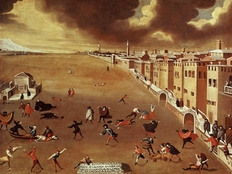 Whether consciously or unconsciously, most scholars study something important to their societies. The walls of the ivory tower are, in fact, quite porous. It's no surprise that the genre of history that deals with environmental issues - environmental history - grew out of the debates surrounding the use of DDT. No surprise, either, that academics within disciplines from anthropology to economics are increasingly considering the influence of climate change just as the effects of global warming are becoming painfully obvious. Now more than ever, research into past climates is not just for scientists. If environmental history grew steadily in the decades since its conception, so too did its semi-autonomous, interdisciplinary cousin: climate history, or historical climatology. This site regularly describes some of the more interesting work published by historical climatologists, before considering how it can reframe today's environmental issues. Equally striking, however, is what's not (yet) published, but spoken. Testament to the growing importance of climate history within environmental history, interviews about past climates have aired this year on two of the major audio resources in the discipline: Nature's Past and Environmental History Resources. Moreover, last year the growing diversity of climate history was well represented at the major conference for the North American branch of environmental history. In Madison, Wisconsin, papers explored how a shifting climate influenced issues ranging from nineteenth century famines in the far north to the construction of the St. Petersburg ice palace during the frigid winter of 1740. Even more topics are on this year's agenda. In Toronto climate change will be connected to cold war national security, the history of Lake Superior, Alberta's fossil fuel economy, the hydrology of central Mexico, warfare down the Danube, early modern transportation, and much more. As the study of past climate change claims an increasingly important place within environmental history, it has also entered the mainstream of the historical profession. At this year's meeting for the American Historical Association - the largest conference in the discipline - climate history was featured in three back-to-back sessions. As described by Sam White of the Climate History Network, historians unraveled how past climatic variability influenced hurricanes in New Orleans, agricultural sustainability, and human history across many thousands of years. Rising interest in climate change within history and other non-scientific disciplines is obvious in published scholarly literature. It is equally apparent online and at conferences, where the insights described and discussed have equal relevance for our struggle to make sense of a warming planet. ~Dagomar Degroot |
Archives
March 2022
Categories
All
|

 RSS Feed
RSS Feed